As the global community begins the 16 Days of Activism Against Gender-Based Violence, the Nigeria Association of Women Journalists (NAWOJ), Zone D, has urged governments in the North Central region and the Federal Capital Territory (FCT) to establish dedicated funding streams for GBV prevention and survivor support.
In a statement issued on Monday by the Zonal Secretary, Juliana Ose Ofoku, the Zonal Vice President, Chizoba Ogbeche, described violence against women and girls as a human rights emergency requiring urgent and sustained government intervention.
Ogbeche noted that one in every three women experiences some form of violence, stressing that the media plays a vital role in amplifying survivors’ voices, challenging stereotypes, and sustaining public attention on abuse.
She expressed concern that insecurity, economic hardship, harmful cultural norms, and weak institutional enforcement continue to increase the vulnerability of women and girls across communities.
NAWOJ called on state governments and the FCT Administration to fully implement the Violence Against Persons Prohibition (VAPP) Act and the Child Rights Act across all North Central states. Ogbeche emphasized that despite increased awareness, cases of GBV remain widespread, under-reported, and often minimised.
She further advocated the establishment and strengthening of dedicated GBV desks in police formations, schools, and health facilities to enhance response mechanisms and accountability.
Reflecting on the 2025 global theme, “UNiTE to End Digital Violence Against All Women and Girls,” Ogbeche condemned the rising cases of online abuse, describing digital violations as an extension of offline violence facilitated by technology.
She stressed that digital platforms should empower rather than endanger women and girls, calling on stakeholders to work collaboratively to create safer, more inclusive online spaces where women’s voices are respected, protected, and amplified.
By Sophina Ovuike, Abuja

























